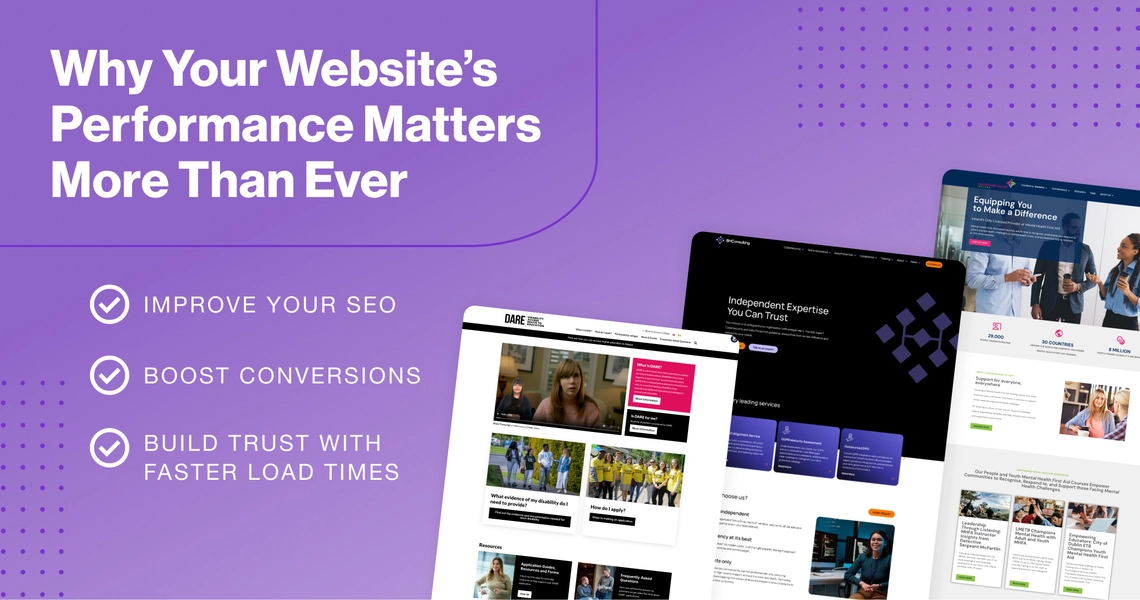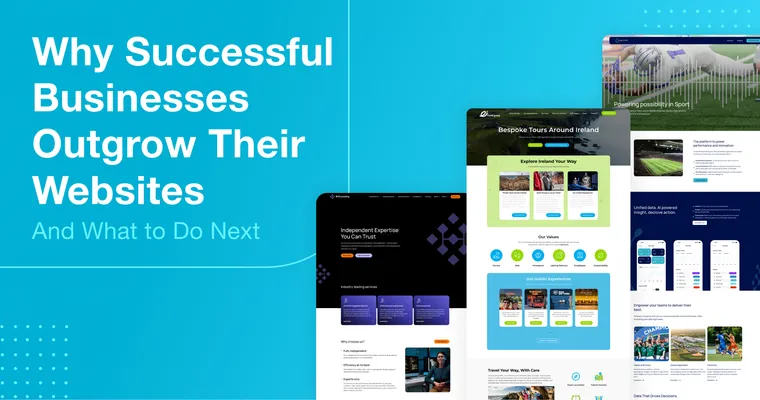Summary
Your website’s speed and responsiveness can make or break your online success. A slow site hurts SEO, frustrates visitors, and costs you conversions. With more people browsing on mobile and Google prioritising fast-loading sites, performance has never been more important. In this post, we explain why your site’s speed matters, what slows it down, and how professional website performance optimisation in Ireland can transform your results.
Why Website Speed Matters
In today’s digital world, visitors expect instant results. Studies show that a delay of even one second can lead to a noticeable drop in conversions. Every extra second a page takes to load increases bounce rates and decreases trust.
A fast site improves:
- User experience: visitors can browse, shop, and contact you effortlessly.
- Search rankings: Google rewards fast, mobile-friendly websites.
- Conversions: when your site feels seamless, customers stay and take action.
- Brand credibility: speed signals professionalism and reliability.
Performance is no longer a “nice to have” it’s part of your brand identity.
Common Causes of Poor Website Performance
Many businesses don’t realise how small technical issues add up. The most common performance problems include:
- Unoptimised images and videos: oversized files slow everything down.
- Poor hosting: low-quality servers create lag, especially during traffic spikes.
- Too many plugins or scripts: unnecessary code and third-party tools increase load times.
- Lack of caching: without caching, your site rebuilds pages from scratch every time.
- Old or inefficient code: outdated CMS themes or frameworks drag performance down.
Identifying and addressing these issues is the first step toward improvement.
How 2Cubed Optimises Website Performance
At 2Cubed, we take a structured, results-driven approach to performance optimisation designed to improve both speed and user satisfaction.
Our process includes:
- Comprehensive audit: we analyse current load times, Core Web Vitals, and technical bottlenecks.
- Image and asset optimisation: compressing and re-formatting media for the web without losing quality.
- Code clean-up: removing unused CSS, JavaScript, and scripts that weigh pages down.
- Server and caching upgrades: integrating CDN and caching systems for instant page delivery.
- Performance testing: testing across browsers, devices, and connection speeds.
- Continuous monitoring: performance tracking to maintain speed after launch.
The result? A faster, smoother experience that drives SEO and conversions and keeps visitors coming back.
The Business Benefits of a High-Performance Website
When your website runs efficiently, everything improves:
- Better SEO: Google’s Core Web Vitals directly influence rankings.
- Higher conversions: users are more likely to purchase or enquire when the experience is fast.
- Lower bounce rates: fewer visitors leave before engaging.
- Increased retention: repeat visits and brand loyalty rise.
- Reduced costs: efficient code and hosting mean better long-term stability.
Performance isn’t just a technical issue it’s a business growth strategy.
Tips for Maintaining Speed Over Time
Even after optimisation, websites require care to stay fast. Here are a few quick tips:
- Keep plugins and CMS platforms updated.
- Regularly audit your site for broken links or outdated scripts.
- Avoid uploading large, uncompressed media.
- Use a content delivery network (CDN) for global audiences.
- Run quarterly performance checks with your web agency.
A well-maintained site stays secure, fast, and competitive.
Get in touch with 2Cubed for professional website performance optimisation in Ireland and make your site faster, smarter, and stronger.
FAQs About Website Performance Optimisation
Q: What’s a good website load time?
A: Ideally, your website should load in under 2.5 seconds. Anything beyond that risks losing visitors.
Q: Does performance really affect SEO?
A: Absolutely. Google’s ranking algorithm prioritises sites that perform well on mobile, have fast load times, and meet Core Web Vitals standards.
Q: How often should I review my site’s performance?
A: Every 3–6 months is ideal, or after any major update or redesign.
Q: Can 2Cubed improve my site’s performance without rebuilding it?
A: In many cases, yes. We can optimise hosting, images, and code without a full redesign but if your site is outdated, a rebuild may be the most effective option.
Q: How do I know if my site has performance issues?
A: If your site feels slow, drops in rankings, or reports poor Core Web Vitals in Google Search Console, it’s time for an audit.



